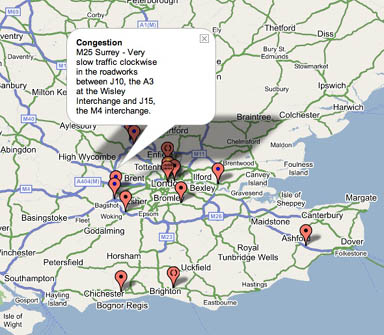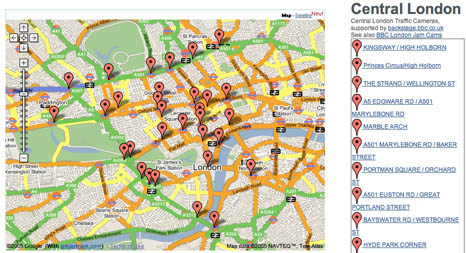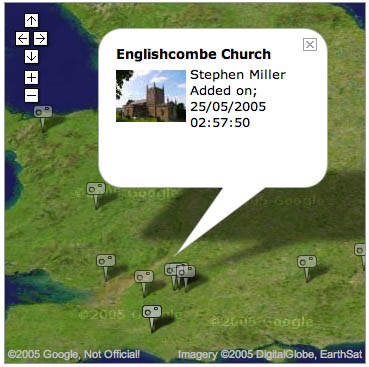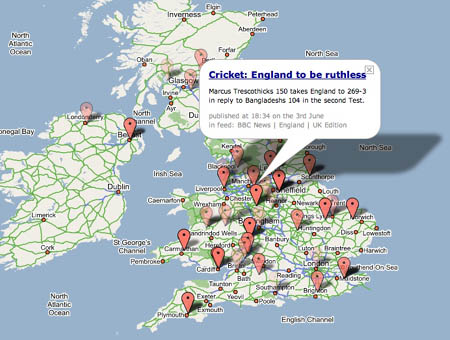There’s been an explosion of creative tinkering since the BBC opened up its API (applications programming interface) last month. An API is a window into a site’s code and content allowing techie types to build new applications with BBC material. It’s really worth going over to the BBC Backstage blog to take a look at the first batch of prototypes and demos. The majority are clever splicings of BBC data – news, traffic reports, images etc. – with Google Maps (everyone’s favorite lately), not unlike chicagocrime.org. Other notable examples: an RSS feed of BBC complaints; a feature that allows you to tag articles and read tags left by other readers; and a nice “tag soup” visualization of financial news.
Correction: A reader kindly pointed out that BBC Backstage hasn’t actually released APIs yet (though they intend to soon). The projects I’ve referenced use BBC feeds, or have scraped content directly from the BBC site. APIs are to follow soon (more info here). When they do, the scaping process will become much cleaner. For now, the BBC welcomes projects that “use our stuff to build your stuff” the rough-and-tumble way, and is happy to showcase them on the Backstage site.
The API is becoming a powerful tool for creative reinvention of the web. Back in April, I wrote about Dan Gillmor’s piece on “Web 3.0”.. Web 1.0 was the early web, a place you went to read – a series of interconnected brochures. Web 2.0 is the “read-write” web – it’s a place you go to interact. Web 3.0 is where we start weaving the disparate pieces into new forms. APIs let you do this. You take one application and design a new front end that shows your point of view. Or you take two applications and mix them together, creating something new and illuminating. Right now, Web 2.0 is pretty well in place. The tools for self-expression and interaction are pretty accessible – email, chat, blogs, etc. But the weaving tools required for 3.0 are available only to advanced users. We’ll see if that changes.
Here are grabs from four of the map prototypes at BBC Backstage:
Traffic Maps:

Map of BBC London Jam Cams:

Photo Mapping:

Map of the News:

For more analysis, check out this article on O’Reilly Radar.

BBC on Steroids
Apparently people have been going nuts with the BBC API. The BBC Backstage blog (“Use our stuff to build your stuff”) is currently blowing my mind just a tad. Bayesian news filtering! BBC.icio.us! Extract names and places from stories! News…
This entry is slightly inaccurate.
The BBC hasn’t, to my knowledge, actually released any *real* APIs yet. The projects you’ve pointed out get their data either from the BBC’s RSS feeds (which have been around for years), or by scraping the BBC’s Web site (which is far, *far* from being a clean, official API). BBC Backstage just provides a place to collect these projects. The novel thing at this point is that BBC has collected a bunch of third-party projects in one place.
I guess it can be argued that RSS is an API in itself, but it’s not “a window into a site’s code and content,” as you’ve described above. The “BBC API” as you’ve alluded to doesn’t yet exist.
Don’t get me wrong — I love BBC Backstage and don’t mean to criticize it. Just wanted to point out that there aren’t actually any APIs yet.
Les coulisses de l’innovation de la BBC : un modele !
Je suis personnellement tout à fait impressionné par les coulisses de la BBC. Ce service (en version beta) a pour but d’encourager l’innovation par les utilisateurs à partir des contenus de la BBC (via des fils RSS et prochainement des web services o…